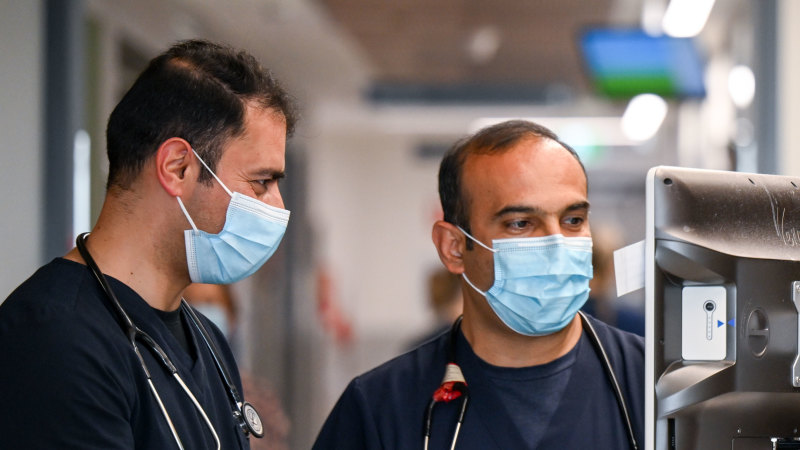Edriss is a cancer doctor, but was told he should work in a factory

Save articles for later
Add articles to your saved list and come back to them any time.
Not so long ago, Edriss Noorzai was an oncologist, treating patients with cancer in a Kabul hospital.
But when he arrived in Australia from Afghanistan in 2022, he was told by employment agencies that it would be better if his résumé didn’t mention that he was a specialist doctor.
Refugee doctors Faisal Ahady (left) and Edriss Noorzai were at risk of having their skills wasted. However, they have been put to work at Frankston Hospital.Credit: Eddie Jim
“Everyone was telling me, ‘Don’t put these things in your CV. If you put these things in your CV and apply for basic kinds of work, no one will accept you’,” said Noorzai, aged in his 30s.
“Some people were telling me to go to other fields, like construction or factories.”
It was a similar experience for Faisal Ahady, a father of three who pursued his childhood dream to become a doctor.
When the Taliban took over Afghanistan in August 2021, the work he had done with the Australian government and other international projects made him a target. He was offered a temporary visa in Australia, along with his family.
Still, the employment agencies in Australia also advised Ahady that he should remove his medical qualifications from his résumé and perhaps apply for administration work, which he was also skilled in.
Dr Karen Dunwoodie, the director of the Deakin Centre for Refugee Employment, Advocacy, Training and Education (CREATE), said she had heard similar accounts from other highly skilled arrivals from places upended by conflict and crisis such as Afghanistan, Ukraine, Venezuela, Syria, Iran and Iraq.
And it’s not just doctors being told to downplay their skills, but also former lawyers, judges, dentists, journalists, museum curators, academics, architects, engineers and senior bureaucrats.
Dunwoodie believes people were being encouraged to take their professional qualifications off their résumé and seek lower-skilled work because some employment agencies had goals or targets around the volume of people they got into work.
There was less focus on matching people with their skills.
“It’s much easier to find work in low-skilled work, rather than spending the time and resources to assist someone who is highly qualified.”
Dunwoodie said highly skilled refugee women found it particularly difficult, and were usually funnelled into jobs in childcare, aged care, hospitality and cleaning “with little acknowledgment of their previous experience”.
Some people were also advised to change or anglicise their name to make them sound less foreign, she said.
Ukrainian Olga Hurina, 42, moved to Perth in March last year as a refugee after the Russian invasion. Her husband remains in Ukraine.
“My husband urged me to leave Kyiv because it was dangerous to stay in the city,” she said.
“Russian soldiers in the territories they occupied were cruel to the civilian population, and there was no regard for international humanitarian law.
“With only a backpack in my hand, I landed at Perth Airport, unsure of what my future held.”
Before the war, Hurina had a successful legal career, working as a manager at the National Agency on Corruption Prevention. But she said the employment agencies she first dealt with in Australia were not equipped to find jobs for people with her skills.
“Their purpose is to find a very simple job for people, and I think they have difficulty with cases like me,” she said.
Dunwoodie said governments, employers and universities needed to work together to find better solutions to the underemployment of highly qualified new arrivals to Australia.
CREATE – founded in 2019 – has been bridging the gap for hundreds of new arrivals with professional qualifications, providing career clinics and one-on-one mentoring to help people find meaningful work that better matches their experience.
Through a CREATE women’s career clinic and a course with the Adult Migrant English Program at TAFE, Hurina said she improved her résumé and found work as a compliance analyst.
CREATE also helped Noorzai and Ahady secure hospital jobs at Peninsula Health in Melbourne, keeping them employed in the sector while they go through the arduous process of having their qualifications recognised locally.
Peninsula Health’s director of nursing and midwifery, Fiona Reed, said 20 staff had been employed through the CREATE program, at a time when many health services were battling unprecedented workforce shortages.
Noorzai said at first it was stressful thinking he would have to start “everything from the beginning again,” but he has passed his first Australian Medical Council exam, paving the way to be again registered as a doctor, an important first step in his goal to again practise as an oncologist.
Ahady has been working in several units of the Frankston Hospital, including the emergency department, in Melbourne’s south, under the supervision of local doctors, taking physical examinations and conducting tests.
In an exclusive offer for subscribers, order a copy of Life As We Knew It: the extraordinary story of Australia’s pandemic by Aisha Dow and Melissa Cunningham from Scribe for 30 per cent off the retail price. Click here for details. This offer is available until October 31.
Most Viewed in Politics
From our partners
Source: Read Full Article
